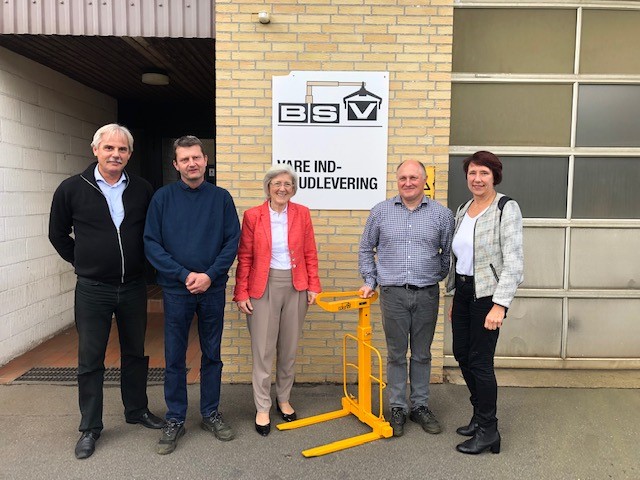
Jens Ulrich Nielsen,Force; Fleming Jensen , BSV; Eva Diedrichs, IMP³rove Academy, Allan Ricardy, BSV; Merete Norby, MADE (from left)
Part of the DIHelp project is the assessment of local SMEs’ digital innovation capacity. The assessment results – based on the IMP³rove Digital Innovation Quotient (DIQ) – provide the Digital Innovation Hubs with insights into the local companies’ need for support in leveraging digitization for innovation.
In Denmark, the DIHELP Academy supported the feedback workshops with two local SMEs that had already completed the DIQ with the support of a local consultant, member of MADE, the digital innovation hub in Denmark. During these events the SME management together with MADE, the consultants and IMP³rove Academy (consortium member in the DIHELP project) discussed the SME’s strengths and weaknesses in digital innovation. Starting point was the Digital Innovation Quotient’s almost 100 page benchmarking report for BSV and Jörgensen Engineering.
BSV Krantilbehør A/S based in Vejen, Denmark, was established in 1960 specializing in developing, producing and selling lifting equipment for cranes with a team of 30 employees. BSV is a local company operating globally through a network of international dealers. “At the beginning, we were a bit scared when we were introduced to the IMP³rove Digital Innovation Quotient, an assessment to benchmark our digital innovation capabilities on an international scale. However, when we received the 100 page benchmarking report and then also a detailed feedback during a 3 hour workshop with the representatives from MADE and IMP³rove Academy, we only can recommend this assessment to any company” says Flemming Jensen, CEO of BSV. “We received most valuable feedback that was clearly focused on our business, the size of our company, and on our resources. We will now prioritize the discussed actions and implement them”.
In a similar setting the second feedback workshop with Jorgensen Engineering took place, a company with about 150 employees that develops and produces packaging handling systems for the food, pet food, health care and milk powder industries. Potential areas for digital innovation were discussed related to e.g. the traceability of the products that were handled by the packaging and handling systems, virtual reality to illustrate the set-up of new systems and data analytics – technologies that are either at an early stage of implementation or on the radar to be evaluated for their business impact.
In both cases the discussion of the DIQ assessment results also revealed challenges beyond digital innovation, such as how to get access to university graduates as SME, how to effectively communicate the new strategy into the organization that everybody understands the implications and opportunities that the new strategy offers for each employee.
Overall the DIQ assessment has proven to be an easy to adopt value proposition that digital innovation hubs can offer to the local SMEs. It created benefits for the SMEs, for the digital innovation hub as well as for consultants that are members of the digital innovation hub.

Recent Comments